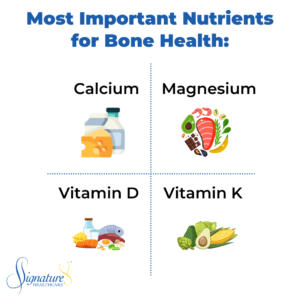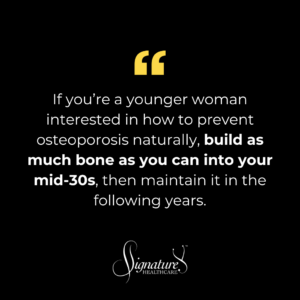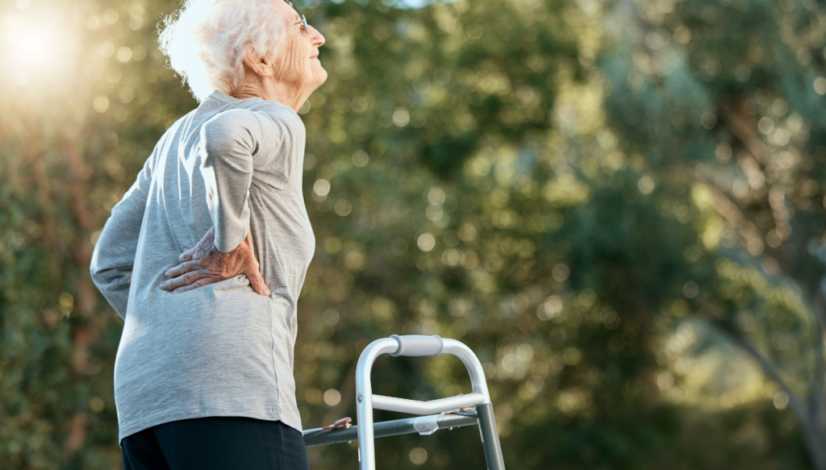Natural Treatment for Osteoporosis: How to Treat Osteoporosis Without Medication
For most of us, aging brings a decrease in strength.
The change typically comes from weakening muscles, declining bone mass (osteopenia), and often eventual osteoporosis, a more severe condition in which bones become fragile and prone to breakage.
Many patients ask how to treat osteoporosis without medication, and in the earliest stages of diminishing bone mass, certain lifestyle modifications may help slow the decline.
But for post-menopausal women already experiencing bone loss, working out with weights 10 hours a week and consuming foods rich in bone-building calcium and vitamin D can become almost a part-time job. And frustratingly, that regimen isn’t always effective.
Although you may want to focus on natural treatment for osteoporosis, genetics alone can sabotage your efforts. In my family, for instance, several generations of women have osteoporosis of the spine, despite our best efforts to prevent it.
Often, natural efforts need a boost from the right medication, as recommended by your concierge physician.

Diet and Exercise for Strong Bones
No magical combination of lifestyle changes can completely prevent bone loss. But let’s look at some diet and exercise factors that may slow its progress.
Essential Dietary Nutrients
To fortify bones, calcium is perhaps the most critical nutrient for your daily diet. I recommend getting most of your calcium — at least 1,000 mg a day — from food:
- Milk and yogurt offer a healthy dose of calcium. An eight-ounce glass of milk contains 300 mg, a third of the daily recommended dose of calcium.
- Bone-boosting vitamin K is found mainly in green leafy vegetables, tofu, and canned salmon and sardines. Spinach, kale, and broccoli, for instance, deliver about 100% of the recommended daily dose of vitamin K. Canned sardines and salmon contain bones, which makes them naturally high in calcium, too.
But we get it: It can be challenging to get calcium from food. Some people are lactose intolerant. And few adults want to consume 24 ounces of milk or eat a plate of sardines each day.
To avoid monotony in your diet, don’t confine yourself to a short list of bone-healthy foods. Follow this link for other food options that provide nutrient-dense sources of calcium. Try some new recipes and mix up your choices daily.
A Word About Supplements
If you don’t feel your diet provides the calcium you need, consider adding 600 mg of calcium citrate (combining calcium, magnesium, and zinc) to your daily routine.
Magnesium and zinc are also important nutrients for bone health — magnesium aids calcium absorption; zinc helps form bone and maintain density.
But be aware: Many calcium supplements aren’t absorbed well by the body, so food sources are still my primary recommendation. Follow your concierge physician’s advice about these or any supplements you decide to take.
Weight-Bearing Exercise as a Natural Treatment for Osteoporosis
For patients who ask how to prevent osteoporosis naturally, exercise can help encourage and maintain bone strength — in particular, weight-bearing exercises like walking, running, and resistance training.
A few ideas:
- Over time, running can be tough on aging hips, knees, and feet, but brisk walking is a great substitute and safer choice for most people.
- Try wearing a weighted vest when you walk — mine weighs 10 pounds. Your doctor can guide you on the optimum amount of weight for your vest.
- Practice regular resistance training. Consistently lifting even light weights strengthens muscles and encourages bone health.
- UK studies show that osteoporosis and bone density may benefit from the use of a low-intensity vibration plate, first developed to help astronauts who lose bone mass after months in space. Low-priced at-home plates may not work as well as a higher-quality model at your gym — look for a low-intensity (0.3–0.4G) vibration plate, and use it for 10–15 minutes, three or four times per week.
Besides incorporating a simple exercise regimen, consider adjusting other aspects of your lifestyle as well. Did you know smoking, alcohol, and caffeine can all weaken or degrade bones over time?
To support bone density, cut back on those potentially damaging habits.
Stay Aware of Your Bone Health
Most women reach optimal bone mass in their early 30s. It’s common for bones to gradually weaken thereafter, and the decline accelerates after menopause.
If you’re a younger woman interested in how to prevent osteoporosis naturally, build as much bone as you can into your mid-30s, then maintain it in the following years. (This goes for males as well, although men’s bones are not prone to degrade as quickly as women’s.)
It’s reasonable for women to receive a baseline bone-density diagnosis around menopause, especially if there’s a family history of osteoporosis. Following the baseline, I recommend a formal bone density test for women over 65 and again at 70+.
We recommend even earlier testing for patients who:
- Experience unusual fractures
- Have a low body mass index or a family history of it
- Use certain medications (steroids, some seizure medicines)
- Have an underlying health condition like rheumatoid arthritis
Note that standard heel-bone density testing can be inaccurate or inconclusive. Your physician can request a DXA scan for you at a radiology center to get you a clear, comprehensive result.

When Medication Makes Sense
For many, lifestyle modifications can help prevent osteoporosis naturally, but those changes alone can’t guarantee substantial or lasting benefit. In the long run, most patients who’ve lost bone mass benefit from targeted medications that build and preserve bone.
By using an online Fracture Risk Assessment (FRAX) tool, you can calculate your likelihood of breaking a bone. Type in certain personal demographics — such as age, height, weight, and family history — as well as medical conditions or previous incidences of fractures. The calculator provides a FRAX score that estimates your risk of a fracture and recommends formal bone density testing as needed.
If your bone health is declining, your Signature Healthcare physician can recommend a broad selection of clinical treatments, including weekly or monthly oral medications, annual infusions, or daily or twice-yearly injections. We discuss the pros and cons of each medication based on your individual needs. Then, we work together to choose the best approach for your bone loss.
The governor of North Carolina has declared May to be Osteoporosis Awareness and Prevention Month. Whether you want to explore how to treat osteoporosis without medication or find help from targeted medication, Signature Healthcare is here to help you take charge of your bone health.

Dr. Elizabeth Perry
Dr. Perry is board-certified in internal medicine, holding a medical degree from the Medical College of Virginia. She completed residencies in internal medicine at the University of Pennsylvania Hospital and in emergency medicine at Johns Hopkins Hospital. Dr. Perry served as the chairperson of the Health Services Committee for the Charlotte Chamber of Commerce in 2006-07 and received the Charlotte Business Journal’s “Women in Business Achievement Award” in 2006. She, her husband Jon, and their three children enjoy outdoor activities and travel.

